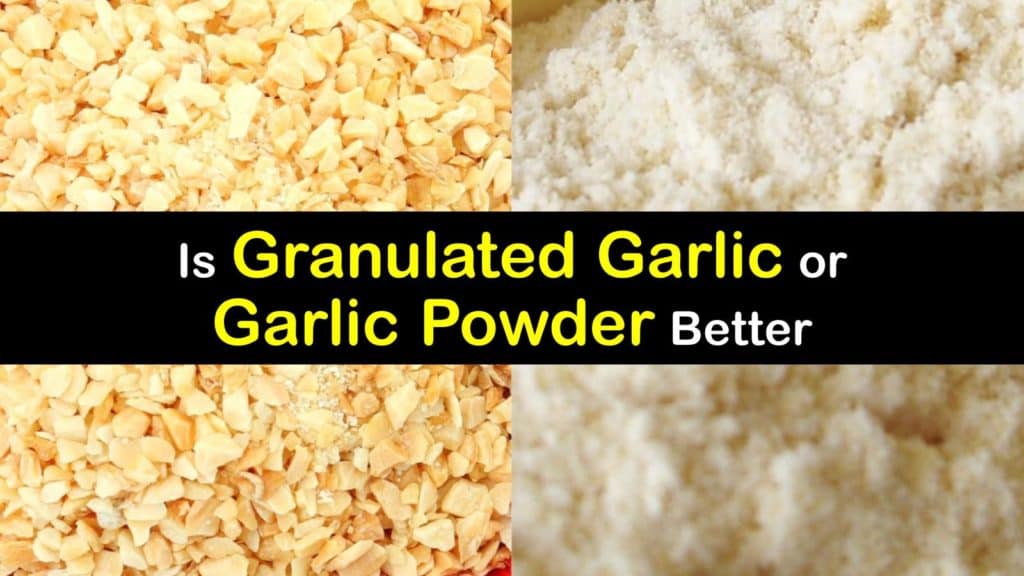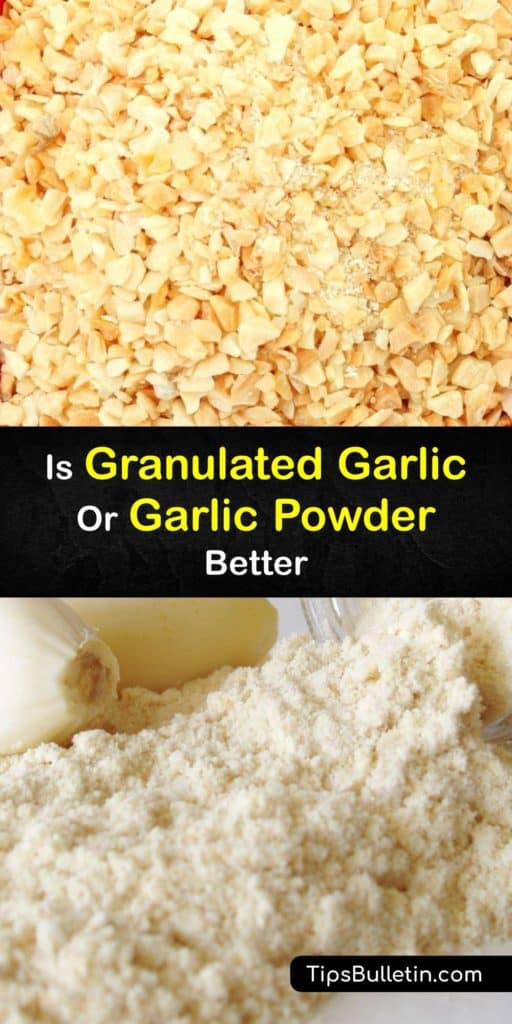There is nothing better than having a spice cabinet stocked fully with spices and herbs, from paprika, cayenne powder, garlic, and curry to rosemary, thyme, and oregano. However, it’s important to understand their differences before adding them to soups, stews, and other dishes. Learn about the differences and similarities of granulated garlic vs garlic powder to get you on the right track.
There are diverse health benefits to consuming garlic, including lowering blood pressure and cholesterol, reducing blood clots, and supporting immune function. However, fresh garlic bulbs and garlic cloves have a limited shelf life, while dehydrated garlic lasts considerably longer and is readily available at the grocery store.
While fresh garlic is always best, the convenience of garlic powder, granulated garlic, minced garlic, garlic flakes, and garlic salt can’t be beat. They are perfect for adding garlic flavor to everything from salad dressing and marinades to garlic bread. However, some garlic spices are stronger than others.

The Differences between Garlic Powder vs Granulated Garlic
It’s always good to have some dried garlic on hand when a recipe calls for garlic, and you are out of garlic cloves. But, how does granulated and powdered garlic differ, and can you use garlic powder as a granulated garlic substitute? It depends on the recipe since one garlic type has a different texture.
Discover the difference between granulated garlic and garlic powder regarding appearance and flavor, the uses and substitutions for both types, and how to use cloves of garlic to make homemade granulated and powdered garlic and seasonings.
If you have a lot of garlic on hand, store peeled garlic cloves in oil for later use or freeze peeled garlic to save for your favorite recipes. You may even want to learn the benefits of pickled garlic and make some of your own for a different twist on this tasty spice.

Difference between Granulated Garlic and Garlic Powder
You have a recipe that calls for a teaspoon of garlic powder, and you head to the grocery store to pick some up. However, you notice that there are many different types of garlic in the spice aisle. What’s the difference between granulated garlic and garlic powder?
Granulated and powdered garlic are both made from dehydrated garlic, but they have different textures. Garlic powder has a fine consistency similar to flour, while granulated garlic has coarse granules with a texture like cornmeal.
Garlic powder is more potent with a more intense flavor than the granulated type, is better for marinades and recipes with a shorter cooking time. Granulated garlic is a preferable substitute for fresh garlic, is less likely to clump like powdered garlic, and is a good choice for adding to liquids like salad dressings, soups, and sauces.
Is Garlic Powder an Ideal Granulated Garlic Substitute?
Is granulated garlic the same as garlic salt, and can you use it as a granulated garlic substitute? While all the spice bottles are labeled as garlic in one form or another, not all of them are suitable substitutes. Find out which types are good replacements for each other and which ones to avoid.
While garlic powder is a convenient substitute for granulated garlic, its flavor is more intense, and less is required. A quarter teaspoon of garlic powder equals one fresh garlic clove, and a half teaspoon of granulated garlic is the equivalent to one clove.
To replace garlic powder for the granulated form, use one teaspoon of powder for two teaspoons of granulated. If you need to replace powdered garlic with granulated, use one teaspoon of granulated for each half teaspoon of powder.
Unlike garlic powder and granulated garlic, garlic salt contains 80% salt and 20% garlic powder, leaving you little control over the amount of salt you add to a dish.
Making Homemade Granulated Garlic vs Garlic Powder
Now that you understand the differences between granulated vs powdered garlic, why not make your own homemade batch of each one? If the idea of making granulated or powdered garlic from scratch seems daunting, think again. These two seasonings are easy to prepare and a great way to stock up your spice cabinet.
The first step to make both granulated and powdered garlic is to prepare the fresh garlic cloves. Separate and peel the individual cloves, cut them into thin slices, and discard any green shoots.
Do not mince the garlic since the pieces are too small for drying. Use as many heads of garlic as you desire. Six heads give you 24 teaspoons or half a cup of garlic powder and about half that amount of granulated garlic.
Spread the garlic slices in a layer on food dehydrator screens and dry them at 125° in the dehydrator for up to twelve hours or until crispy. Rotate the trays several times for even drying. If you do not have a food dehydrator, spread the garlic on a baking sheet and dry them in the oven at 150 to 200°F for one to two hours.
Let the garlic slices cool, and blend them in a blender or coffee grinder. How long you process them depends on whether you are making powdered or granulated garlic.
For granulated garlic, blend them until they reach the desired granular consistency, and process them longer for garlic powder. Pour the garlic into an airtight container and store them in the kitchen or pantry away from heat sources to prevent caking and spoilage.
When does garlic go bad after drying? You can use powdered or granulated garlic for up to three years after dehydrating it.
How to Make Seasonings with Granulated and Powdered Garlic
We love sprinkling garlic herb seasoning on toasted slices of French bread and soup. It even tastes great on tacos or as a dry rub for meats, and you don’t need to run to the grocery store to get it. Learn how to make this homemade seasoning using powdered and granulated garlic.
Combine two tablespoons of garlic powder or four tablespoons of granulated garlic with the rest of the spices in a bowl and whisk until they are thoroughly blended. Pour the spice mix into an airtight container and store it in a cool kitchen area for up to a year.
We love sauteing freshly chopped garlic with shallots, mushrooms, veggies, and olive oil. However, there are times when our fridge is fresh out of garlic cloves. Fortunately, granulated and powdered garlic are great substitutes for a recipe that needs that famous garlic flavor.

We hope that understanding the differences between granulated garlic vs garlic powder helps you prepare the tastiest recipes, and we’d love it if you’d share our powdered garlic vs granulated garlic guide with the garlic-lovers in your life on Facebook and Pinterest.